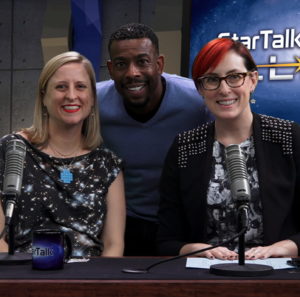While listening to an astrophysics podcast, I stumbled into an epiphany about my course of study at Princeton. It was Neil DeGrasse Tyson’s StarTalk, and two female astrophysicists had been invited on the show to discuss women in the field. About halfway through the episode, I asked myself why I wasn’t pursuing astronomy as a major, especially since I’ve had a fascination with space since childhood. I circled back to high school for an explanation. I had gotten an A- in pre-calculus for the year, and since I was immersed in the high school mindset of perfectionism, I convinced myself I wasn’t good enough at math to pursue anything in the STEM fields. My fellow PCUR blogger Vidushi wrote about how this same feeling I had of lacking “innate brilliance” creates gender gaps in fields like astrophysics. She writes, “Women who don’t see themselves as innately brilliant mathematicians, musicians, or philosophers often do not give themselves the chance to pursue these disciplines.”

When it came time to apply to Princeton, I looked for things I thought I’d be “better” at, and that’s when I started looking into social sciences. I was attracted to the interdisciplinary nature of politics and had always enjoyed French in high school, so I decided to pursue these once I got to college. This course of study has not been easy by any means; however, I sometimes felt like I had settled into these fields because I wasn’t confident enough to pursue other ones. Complaints from my peers about the difficulty of the math and physics courses necessary to study astrophysics overwhelmed me, so I denied myself the opportunity to explore them. I also had this realization at the end of sophomore fall–right before having to declare a concentration in the spring. If you’re struggling with what you want to study at Princeton, hopefully I can give you some encouragement!
My epiphany about wanting to incorporate STEM into my studies was quickly followed by realism on my part, and that of my advisers. I haven’t taken any math or physics at the college level in a year and a half, and there’s no crossover between my studies of French and Politics and Astro. I also know the field isn’t as glamorous as Cosmos makes it seem: it’s difficult and quantitative research, but I’m determined to give it a shot. My plan is to just take as many relevant courses to Astro as possible, namely math and physics, while keeping on track with my French major.
In my pursuit of math and physics at Princeton, I am preparing myself to learn a well-known but easily ignored lesson: grades are not validation. Disbelieving this led me to my current dilemma; had I judged myself based on how much I learned instead of a quantitative representation of my success, I would be well on my way to an Astro major. Further, as a minority woman at Princeton, I felt that great grades were necessary to prove my acceptance wasn’t a mistake – and several of my peers have felt this same pressure. Going forward, I need to use my depth of knowledge as a measure of my success so I do not lose the conviction to pursue this path. I’m incredibly nervous but I also know I am not alone. Peers are some of the best resources of support on campus, both academically and personally, and I plan on leaning on them for support throughout this transition.
I’ve redefined my goals for my Princeton experience. Personally, I want to graduate well-learned in topics I shied away from and more confident overall in my academic ability. What do you hope to get out of Princeton? It’s a question I recommend you ask yourself and try to answer honestly. Four years here will be challenging for any student within any concentration, but the motivation behind this challenge, I think, is as important as the challenge itself. I’ve learned that motivation by grades can be straying, so take a moment to self-reflect on what pushes you through your path here, whether it be passion or practicality, other than a stellar GPA.
— Elise Freeman, Social Sciences Correspondent

